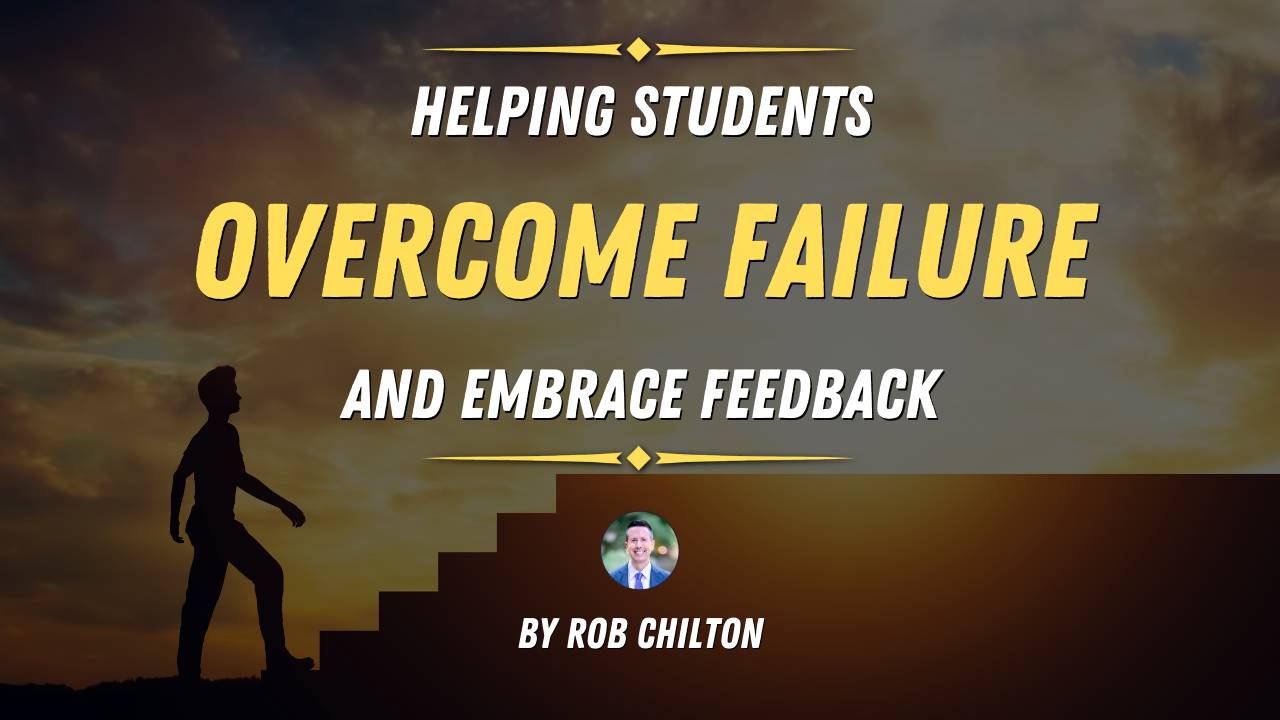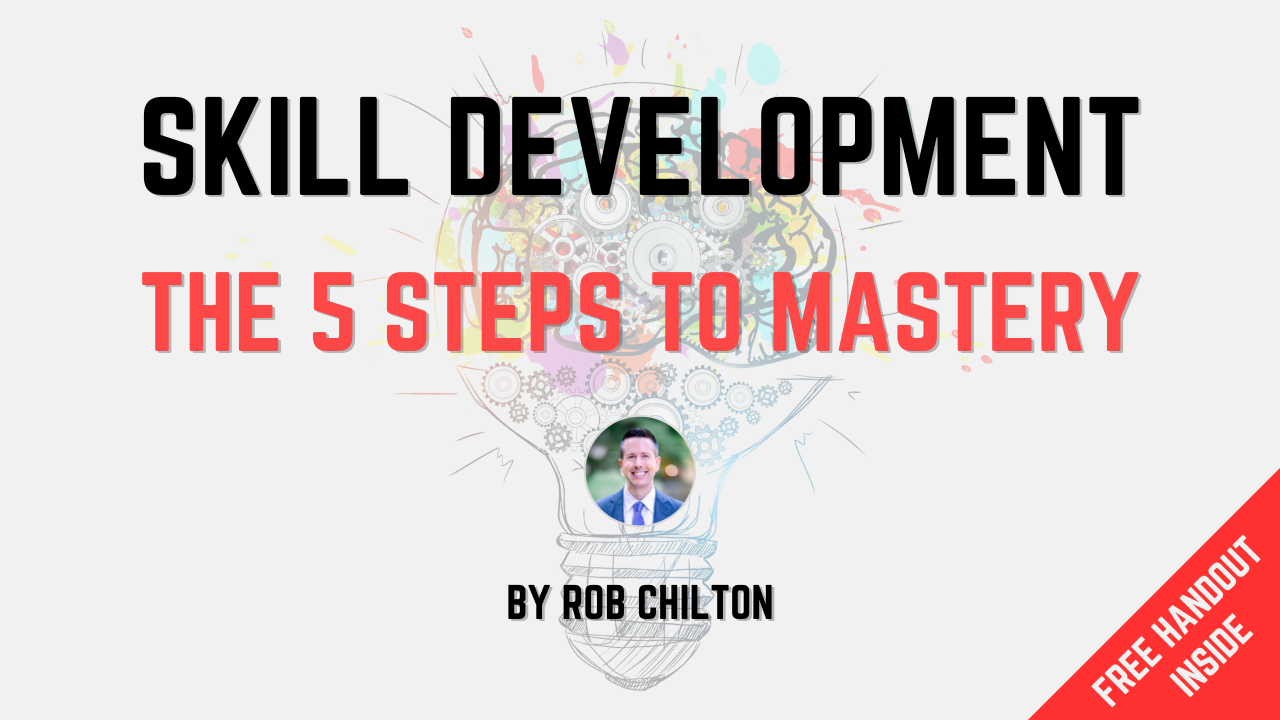Helping Students Overcome Failure & Embrace Feedback
Jul 01, 2024
Estimated Read Time: 5 minutes
By Rob Chilton
In my last article, Pass-offs: Accountability, Motivation, & Self-Directed Learning, we discussed a system for individual pass-offs in the beginning year:

If you haven’t read it, click the link above or the image below to catch-up:
Doing pass-offs means more frequent individual performances, resulting in more opportunities for your students to experience both success and failure under your supervision. Celebrating success is easy. It’s guiding them through failure that’s difficult—especially when the performer cares deeply about the outcome. Providing them with constructive criticism after a failed attempt can be challenging. Today, I'll share a few ideas to help your students overcome failure and embrace feedback.

Embracing Failure: Every Attempt is a Step Toward Success
We must talk with our students about success and failure. Children are often too rigid in their view of it, seeing success and failure in black-and-white terms. For them, failure often evokes feelings of total loss—but that’s rarely the case. Failure is a necessary part of learning and is almost never absolute or permanent!

By definition, failure simply means a lack of success—and there are degrees of it. There’s missing your mark by an inch, and there’s missing it by a mile. This distinction is crucial for kids to understand because only through failure can we gauge the distance we have left to travel (or practice) before reaching our next benchmark or goal.

When working with individuals, I’ve found it more helpful to reframe failure as attempts or attempts toward success. Like learning to shoot a free throw in basketball, every attempt is a step towards a perfect, all-net shot.

Relating Music to Sports: I've Fallen and I Can Get Up!
I like relating music to sports because many children participate in sports or athletic play from an early age. Even those that don't are generally familiar with how sports work. Regarding failure, here's an analogy I use often:

Said with a touch of humor, this analogy almost always elicits laughter while reinforcing the idea that we shouldn’t give up when we make a mistake or encounter failure.
Constructive Criticism: Focus on Actionable Steps
Along with establishing a healthy understanding of failure comes delivering constructive criticism. Constructive criticism—or feedback as I call it—offers specific, actionable steps over general advice.

How much feedback a child can receive and retain depends on their age and experience. Without taking notes, the human brain can retain just 6-8 pieces of information in its short term memory. When it comes to something as complex as musical feedback, I believe the average beginner can process and remember just 1-3 actionable items. Try reducing your feedback to the most important things. Doing so will increase the likelihood they're able to follow through.
Be advised that too much constructive criticism can lead to feedback fatigue—a term coined in organizational psychology—defined as feeling overwhelmed by extensive criticism. I’ve found the easiest way to avoid this is to again reduce feedback to the few most important items.

When Delivering Feedback is Difficult: It's Just Information
Some students exhibit higher sensitivity to feedback than others, manifesting these sensitivities in various ways. In my experience, this occurs most often when a child is struggling to separate their performance from their identity—perceiving the feedback as a direct affront on their sense of self. We must guide these sensitive students to understand that our critiques are aimed at their performance, not them personally. For me, the easiest way to do this is with three simple words: it's just information.

Information is at the root of all learning. By presenting feedback as information, the sensitive learner can learn to reframe constructive criticism as non-emotional knowledge necessary in their pursuit of success.
Acknowledge, Remind, Instruct
The final piece of the puzzle is acknowledging effort. Doing so validates a student's hard work, encourages future attempts, and improves engagement. Everyone wants (and needs) to be acknowledged. You can put all of this together in three easy steps: acknowledge, remind, and instruct.

Here’s how it works:
- Acknowledge: Acknowledge their effort.
- Remind: Remind them that the feedback you are about to provide is just information. It reduces negative impact and increases the chances they’ll positively receive your information.
- Instruct: Provide constructive criticism—or feedback—that is specific, actionable, and developmentally-appropriate.
Here’s an example of what I might say to a beginner in a midyear pass-off:
- Acknowledge: That was a great attempt! Thank you for your effort!
- Remind: Here is what you need to work on to pass it off. Remember, this is just information!
- Instruct: Check your key signature. In measures 3, [pause] play an A-flat instead of an A-natural. Then, in measure 5, [pause] notice there's a three-note slur. Practice these measures at a slower tempo at home. With a bit more practice you’ll be ready to try it again!
Don’t forget to insert wait time or pauses in your instruction. It allows them time to find their place in the music, process the feedback, and commit it to memory. It also provides you time to check for understanding by watching their facial expressions and body language.
Listen, Process, & Record: Write It Down!
Ask your students to listen, process, and record your feedback. Encourage them to make musically-appropriate, meaningful markings in their music. This will help stimulate their memory later when practicing or performing.

To help your students develop a habit of recording feedback, make marking music as a group something you do every day—and teach them your preferred markings! This will reduce incorrect and sloppy markings. And remember, they’ll only do it if it’s taught, reinforced, and expected. (PS - They’re more likely to have or get a pencil if it’s used every day!)
Check out our music literacy method!
Conclusion
As teachers, we share our students' desire to succeed. Feedback, when delivered properly, is just information—and information is the foundation of all learning. When delivering feedback, consider if it’s:
- Developmentally-appropriate
- Reduced (1-3 items)
- Actionable (clear steps for moving forward)
- Just information
Stay tuned for more!
Suggested post:
Never miss a new posting!
Check out this short video!
About the author:

Rob Chilton is the creator and owner of Readymade Music, LLC and its content. Previously, Chilton was a middle school band director from 2007-2021. His most recent teaching position was the Head Band Director at Killian Middle School in Lewisville, Texas from 2014-2021.
Under his direction, the Killian Honors Band was named the 2018 Texas Music Educators Association CC Honor Band and performed at the annual 2018 TMEA Clinic/Convention. In 2019, the Killian Honors Band was invited to and performed at The Midwest Clinic in Chicago. Additionally, the Killian Honors Band was named a National Winner in the Mark of Excellence National Wind Band Honors Project in 2015, 2016, 2017, 2018, and 2019.
Chilton is a graduate of Southern Methodist University where he had the opportunity to study music education under the tutelage of Lynne Jackson and Brian Merrill. During his years as a middle school band director, Chilton continued his professional growth under the guidance of his primary clinicians, John Benzer and Brian Merrill.
Chilton’s mission for Readymade Music is to promote the overall well-being of music education and support school music teachers by providing solutions to help make teaching music more efficient and inspirational while increasing engagement for 21st century learners.

© 2024 Readymade Music, LLC
All rights reserved.
The unauthorized distribution and/or reproduction of this work is illegal.






